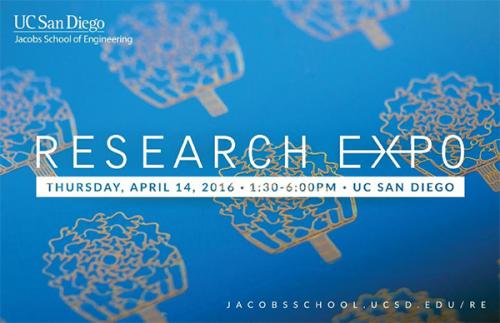
For the school-wide research poster session at the 2016 Jacobs School of Engineering Research Expo on April 14, nearly 30 posters were presented by CSE graduate students, including six posters presented by students of CSE Prof. Ravi Ramamoorthi in an area reserved for researchers in the Center for Visual Computing (directed by Ramamoorthi). . The winner of the Best CSE Poster award was a team of three students advised by CSE Prof. George Porter (see story above).
 Like Ramamoorthi, CSE Prof. Ryan Kastner's students had six posters on display at Research Expo. Four of them -- by grad students Quentin Gautier, Alexandra Shearer, Antonella Wilby and Perry Naughton -- were exploration-themed, in part deriving from the students' prior work in the Kastner-led Engineers for Exploration program. Three other computer-engineering projects were presented by Alireza Khodamoradi and Alric Althof on IBIT-compressed imaging, Dajung Lee on hardware-accelerated graph analytics in a reconfigurable system, and machine learning for system-level design space exploration on FPGAs (a joint project of Althoff and Gautier with Pingfan Meng). CSE Prof. Tajana Rosing was the next-most-represented faculty member in the CSE poster session, showing the research of Mohsen Imani on approximate computing using configurable associative memory, Akanksha Maurya on time-series data clustering for Internet of Things applications, and Pietro Mercati and recently-graduated Baris Aksanli with a computational modeling approach touser behavior for swarm control applications.
Like Ramamoorthi, CSE Prof. Ryan Kastner's students had six posters on display at Research Expo. Four of them -- by grad students Quentin Gautier, Alexandra Shearer, Antonella Wilby and Perry Naughton -- were exploration-themed, in part deriving from the students' prior work in the Kastner-led Engineers for Exploration program. Three other computer-engineering projects were presented by Alireza Khodamoradi and Alric Althof on IBIT-compressed imaging, Dajung Lee on hardware-accelerated graph analytics in a reconfigurable system, and machine learning for system-level design space exploration on FPGAs (a joint project of Althoff and Gautier with Pingfan Meng). CSE Prof. Tajana Rosing was the next-most-represented faculty member in the CSE poster session, showing the research of Mohsen Imani on approximate computing using configurable associative memory, Akanksha Maurya on time-series data clustering for Internet of Things applications, and Pietro Mercati and recently-graduated Baris Aksanli with a computational modeling approach touser behavior for swarm control applications.
Only two other CSE faculty members had multiple graduate posters on display in the Price Center. CSE Prof. Bill Griswold advised Yan Yan and Massimiliano Menarini, whose poster explored continuous semantic inspection for software evolution, while Soohyun (Eileen) Nam reported on her investigation of the impact of class size on peer instruction in computing (jointly advised by Griswold and Leo Porter). Two other poster presenters were advised by CSE Prof. Vineet Bafna: Seong Won Cha's work dealt with proteogenomics for the detection of colorectal cancer-related antibody peptides; and Viraj Balkrishna Deshpande, whose research is on identifying and reconstructing tumor amplicons. In addition to Bafna, Deshpande is also advised by professors Pavel Pevzner and CK Cheng.

